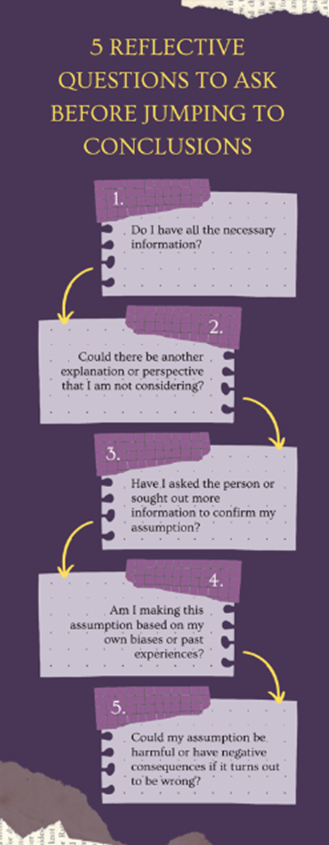When we’re feeling annoyed, it’s so easy to jump to conclusions and tell ourselves a story about why the other person is doing the ridiculous thing that they are doing which is somehow messing up our life. Then, based on these assumptions we get angry and reactive. We’re all familiar with this dance. Today, instead of focusing on how this happens at home with our family, just to mix things up a little and give a quick example of how this also happens at work. And then I’m going to show you another path forward that will help you create better outcomes as you move away from conflict.
A team was working on a new project that was crucial to the success of the business. As the deadline approached, tensions were high and everyone was working long hours to get the project finished.
Becky was in charge of a specific aspect of the project. She had been working on it for weeks and felt confident that it was ready to be integrated with the rest of the project. But, when she showed her work to the team lead, Ben, he was not satisfied and told her that it needed to be completely redone.
Becky was surprised and a little annoyed by Ben's reaction. She felt like she had done her best, and couldn't understand why Ben was not happy with her work. She assumed that Ben was just being his usual critical difficult self and didn't appreciate her efforts.
Ben, on the other hand, had a different perspective. He had experience with similar projects and knew that the work Becky had presented would not meet the standards required for the final product. He assumed that Becky had not done enough research and belileved that she probably wasn’t experienced enough to understand the requirements of the project.
The two of them started to argue and the situation quickly escalated. The rest of the team was caught in the middle, and the project was delayed as a result.
Have you ever ended up in a heated argument just because of a wrong assumption XYZ?
The conflict between Ben and Becky arose due to assumptions made about each other's work and intentions.
They didn’t take the time to understand each other's perspective, and it led to a breakdown in communication and trust.
We make assumptions all the time, often without even realizing it.
How can we avoid it? Take a moment to reflect.
Avoid jumping to conclusions with these 5 thought-provoking questions (print this for future reference!)
- Do I have all the necessary information?
Having all the necessary information can help you to have a more accurate and well-rounded understanding of the situation or the person in question, and it can also help you to make more informed decisions. - Could there be another explanation or perspective that I am not considering?
Considering alternative explanations or perspectives can help you to see the situation or person in a new light and to gain a deeper understanding of the underlying issues. It also allows you to be more open-minded and to be less judgmental, which can improve your relationships and interactions with others. - Have I asked the person or sought out more information to confirm my assumption?
Asking yourself this question helps to ensure that the assumptions you make are based on accurate information, rather than misconceptions or biases. - Am I making this assumption based on my own biases or past experiences?
By recognizing the potential impact of one's own biases, stereotypes, and past experiences, it allows you to reflect about what might be shaping the way you interpret the information. - Could my assumption be harmful or have negative consequences if it turns out to be wrong?
If an assumption turns out to be wrong, it could lead to negative consequences for yourself, others involved, or the organization.
In the case above, as it turned out Becky’s had been given an entirely different project to complete with deliverables that didn’t match up with what Ben believed she had been assigned to complete. At the same time, Ben was under a tremendous amount of pressure from one of his superiors to deliver quickly. Instead of addressing the actual problems they got into the usual blame game and stone-walling dance. The two assignments needed to be completed but they were both delayed by the conflict which took time to sort out.
The team eventually realized what was going on and things worked out, but only after damage was done. Had they taken a step back and calmly explored what was really going on, they could have completed both projects by each deadline.
Consider printing out the graphic and ask yourself these five questions next time you're in a situation like this. Remember, we can avoid conflict and stop any misunderstandings from escalating into all-out chaos if we pause and take a moment to reflect.
Until next time,
Gabrielle


- Gabrielle Hartley, author of The Secret to Getting Along

